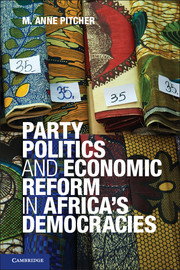Book contents
- Frontmatter
- Contents
- Tables, Figures, and Maps
- Acknowledgments
- Abbreviations
- Map
- 1 Understanding Institutional Development in Africa
- 2 From Motivational to Imperative Commitment
- 3 The Impact of Party Politics and Democratic Quality on Economic Reform
- 4 Party Fragmentation and Ad Hoc Private Sector Development in a Limited Democracy
- 5 Stable Parties, Limited Democracy, and Partisan Private Sector Development
- 6 Stable Parties, Liberal Democracy, and Strategic Compromise
- 7 Conclusion
- Appendix 1 Coding Scheme
- Appendix 2 Coding Scheme Indicators of Imperative Commitments
- Appendix 3 Effective Number of Parliamentary Parties (ENPP) in Nine African Democracies c. 1990s–2000s
- Bibliography
- Index
7 - Conclusion
Rules, Politics, and Discretion
Published online by Cambridge University Press: 05 June 2012
- Frontmatter
- Contents
- Tables, Figures, and Maps
- Acknowledgments
- Abbreviations
- Map
- 1 Understanding Institutional Development in Africa
- 2 From Motivational to Imperative Commitment
- 3 The Impact of Party Politics and Democratic Quality on Economic Reform
- 4 Party Fragmentation and Ad Hoc Private Sector Development in a Limited Democracy
- 5 Stable Parties, Limited Democracy, and Partisan Private Sector Development
- 6 Stable Parties, Liberal Democracy, and Strategic Compromise
- 7 Conclusion
- Appendix 1 Coding Scheme
- Appendix 2 Coding Scheme Indicators of Imperative Commitments
- Appendix 3 Effective Number of Parliamentary Parties (ENPP) in Nine African Democracies c. 1990s–2000s
- Bibliography
- Index
Summary
Some scholars have praised the commitment of African governments to the privatization of state-owned assets and declared them successful reformers, whereas others have bemoaned the capture of market reforms by aggrandizing states or condemned the unsuitability of neo-liberal strategies for poor countries. At the heart of the debate about the implementation and outcome of private sector development lie significant questions about how much and what kind of commitments states have made to transform their economies. To answer these questions, this book operationalized Kenneth Shepsle’s distinction between a motivationally credible commitment and a commitment that is credible in the imperative sense. Conceptually dividing these two aspects of commitment differentiates the moment when governments choose to establish limits to their discretionary authority by adopting new formal institutions from that moment at a future time when structures, rules, and interests act to constrain the state’s ability to act arbitrarily. The distinction recognizes the dynamic, temporal, and processual aspects of an institutional reform as significant as privatization.
Assessing Credible Commitments
Reinforcing the theoretical insights offered by the literature on institutions, this book argued that formal institutional arrangements, not governmental reputation or investor beliefs, should constitute the starting point for determining whether governments in developing countries made motivationally credible commitments to build market economies. To isolate that moment when states committed to private sector creation or expansion, I systematically disaggregated key dimensions of the reform process in twenty-seven African countries and identified which formal rules and agencies they adopted. The index revealed that even when the decision to reform was executed in the midst of crisis or driven by exogenous actors such as the World Bank, governments did not embrace a uniform, standard package of neo-liberal prescriptions. Rather, the constitutional revisions, laws, decrees, regulations, and agencies that African governments adopted to withdraw from their economies and create private sectors reflected balanced considerations by states regarding their historical legacies, ideas, and capacities and subtle accommodations to existing and potential partisan coalitions. These results show that institutional choices made by governments in Africa to reform their economies appear neither more, nor less, formulaic than those made by other transitional countries.
- Type
- Chapter
- Information
- Party Politics and Economic Reform in Africa's Democracies , pp. 236 - 250Publisher: Cambridge University PressPrint publication year: 2012

